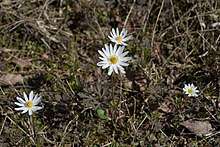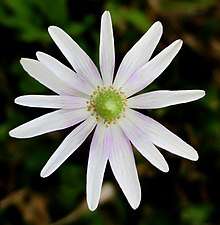Anemone caroliniana
Anemone caroliniana, the Carolina anemone,[6] is a herbaceous plant species in the genus Anemone and family Ranunculaceae. Plants grow (7)10 to 40 cm tall, from short tuber-like rhizomes that are 10–30 mm long. Stem leaves without petioles. Plants flowering early to mid spring with the flowers composed of 10 to 20 sepals (sometimes called tepals) normally white or soft rose colored but also purple, one flower per stem, the sepals are 10 to 22 mm long and 2–5 mm wide. Fruits in heads ovoid to subcylindric in shape, 17–25 mm long.
| Anemone caroliniana | |
|---|---|
 | |
| A. caroliniana flower | |
| Scientific classification | |
| Kingdom: | Plantae |
| Clade: | Tracheophytes |
| Clade: | Angiosperms |
| Clade: | Eudicots |
| Order: | Ranunculales |
| Family: | Ranunculaceae |
| Genus: | Anemone |
| Species: | A. caroliniana |
| Binomial name | |
| Anemone caroliniana | |
| Forms & Varieties * | |
| |
| Synonyms | |
| |
Distribution

Anemone caroliniana is native to central and south eastern parts of the U.S., primarily in the Great Plains and the Mississippi Valley with scattered populations in the Southeast from Tennessee and Mississippi to the Carolinas.[6] Anemone caroliniana was at one time recorded from Vigo County, Indiana, but has since become locally extinct in that state.[7][8]
Habitat
Anemone caroliniana is found growing in dry prairies, barrens and open rocky woods.[9]
References
- Anemone caroliniana was first described and published in the cumbersomely-titled Flora Caroliniana, secundum Systema vegetabilium Linnæi digesta, characteres essentiales naturalesve et differentias veras exhibens; cum emendationibus numerosis, descriptionum antea evulgatarum adumbrationes stirpium plus mille continens, necnon generibus novis non paucis, speciebus plurimis novisq. ornata. London. 157 (-158). 1768 "Plant Name Details for Anemone caroliniana". IPNI. Retrieved June 20, 2011.
Type Information: Locality: Carolina
- "Name - Anemone caroliniana Walter, subordinate taxa". Tropicos. Saint Louis, Missouri: Missouri Botanical Garden. Retrieved June 22, 2011.
- Anemone caroliniana fo. violacea was published in: American Botanist Devoted to Economic and Ecological Botany. Binghamton, NY. 28(2): 80. 1922. "Name - Anemone caroliniana fo. violacea Clute". Tropicos. Saint Louis, Missouri: Missouri Botanical Garden. Retrieved June 22, 2011.
Distribution: USA (Illinois)
- Anemone caroliniana var. heterophylla was published in A flora of North America: containing abridged descriptions of all the known indigenous and naturalized plants growing north of Mexico; arranged according to the natural system. 1(1): 12. 1838. "Name - Anemone caroliniana var. heterophylla Torr. & A. Gray". Tropicos. Saint Louis, Missouri: Missouri Botanical Garden. Retrieved June 22, 2011.
Distribution: USA (Arkansas)
- "Anemone caroliniana Walter". The Plant List; Version 1. (published on the internet). 2010. Retrieved June 22, 2011.
- "Anemone caroliniana". Germplasm Resources Information Network (GRIN). Agricultural Research Service (ARS), United States Department of Agriculture (USDA). Retrieved June 20, 2011.
- "Anemone caroliniana". Flora of North America. eFloras. 3: 10. Archived from the original on 29 June 2011. Retrieved June 22, 2011.
- Biota of North America Program 2014 county distribution map
- Flora of North America Editorial Committee (1997). Flora of North America Vol 3, Magnoliophyta: Magnoliidae and Hamamelidae. Oxford University Press. pp. 139–158. ISBN 0-19-511246-6.